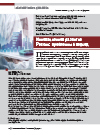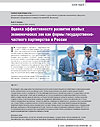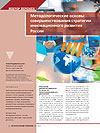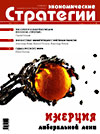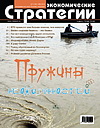Development institutions, their effectiveness and prospects
DOI: 10.33917/mic-4.117.2024.18-26
The author defines a development institution in relation to domestic realities, and also provides a brief overview of the world experience in the functioning of development institutions. The author points out that until recently, Russian development institutions demonstrated a low degree of efficiency, which necessitated reforms in the area under consideration. However, the reforms did not fully solve the assigned tasks, since the foreign policy situation changed dramatically. It is concluded that the basis for low efficiency is insufficient attention to the relationship between the concepts of «institute» and «institution». The author offers a list of activities that are key to improving the situation in the field of development institutions.
References:
1. Kostin K.B., Khomchenko E.A., Burmistrov A.N., Melikova E.F. Foreign direct investment and transnational corporations as potential factors of economic growth of states. Economic relations. 2021;11(4):633–664.
2. GE Global Innovation Barometer 2018. URL: https://www.ge.com/sites/default/files/GE_Global_Innovation_Barometer_2018-Summary_Report.pdf
3. Mapping 500+ Development Banks Qualification criteria, stylized facts and development trends. URL: https://financeincommon.org/sites/default/files/2021-10/mapping-development-banks.pdf
4. SWFI Total Asset Ratings. URL: https://www.swfinstitute.org/fund-rankings/development-bank
5. Kuzenkova V.M. Concepts of development institutions: a retrospective analysis. Bulletin of the Plekhanov Russian University of Economics. 2020;17(1 (109)):40.
6. Monastyrsky E.A., Saklakov V.M. Classification of development institutions. Innovations. 2013;9 (179):65.
7. Sokolov A. Development institutions have failed innovations. Vedomosti, 02.03.2021. URL: https://www.vedomosti.ru/economics/articles/2021/03/01/859742-instituti-razvitiya
8. Botoroeva E. The effectiveness of development institutions will be assessed by 10 indicators. URL: https://www.pnp.ru/economics/effektivnost-institutov-razvitiya-ocenyat-po-10-pokazatelyam.html
9. Skolkovo approved a new KPI system and indicators for 2024–2026. URL: https://ria.ru/20231225/skolkovo-1917898633.html
10. Petrov A.N., Varlamov K.V., Komarov A.V., Matveev D.A. Efficiency of development institutions. Shift in the paradigm of development institutions in the medium term. Economics of Science. 2017;3(4):234.
11. Putin called for support for development institutions that fell under sanctions. URL: https://360tv.ru/news/vlast/putin-prizval-podderzhat-instituty-razvitija-popavshie-pod-sanktsii/
12. Inshakov O.V. Institution and institution: problems of categorical differentiation and integration. Economic science of modern Russia. 2010;3(50):26–38.
13. Deming W. Edwards, Out of the Crisis, The MIT Press, 1994. 524 p.
14. Towards harmonized management and measurement of impact: The experience of development finance institutions. URL: https://one.oecd.org/document/DCD(2021)30/en/pdf
15. OECD-UNDP Impact Standards for Financing Sustainable DEVELOPMENT OECD, UNDP 2021.







